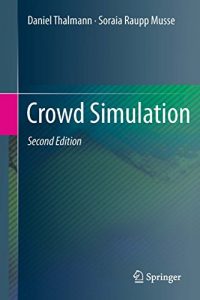Research into the methods and techniques used in simulating crowds has developed extensively within the last few years, particularly in the areas of video games and film. Despite recent impressive results when simulating and rendering thousands of individuals, many challenges still exist in this area.
The comparison of simulation with reality, the realistic appearance of virtual humans and their behavior, group structure and their motion, and collision avoidance are just some examples of these challenges. For most of the applications of crowds, it is now a requirement to have real-time simulations – which is an additional challenge, particularly when crowds are very large.
Crowd Simulation analyses these challenges in depth and suggests many possible solutions. Daniel Thalmann and Soraia Musse share their experiences and expertise in the application of:
· Population modeling
· Virtual human animation
· Behavioral models for crowds
· The connection between virtual and real crowds
· Path planning and navigation
· Visual attention models
· Geometric and populated semantic environments
· Crowd rendering
The second edition presents techniques and methods developed since the authors first covered the simulation of crowds in 2007. Crowd Simulation includes in-depth discussions on the techniques of path planning, including a new hybrid approach between navigation graphs and potential-based methods. The importance of gaze attention – individuals appearing conscious of their environment and of others – is introduced, and a free-of-collision method for crowds is also discussed.






